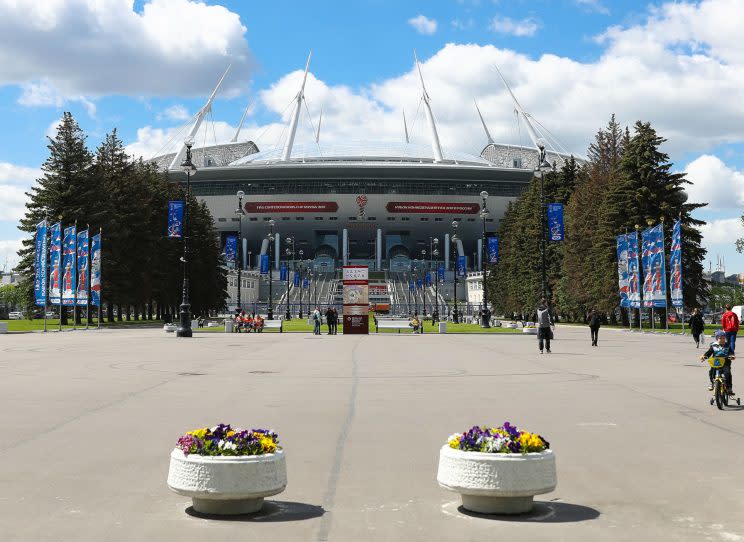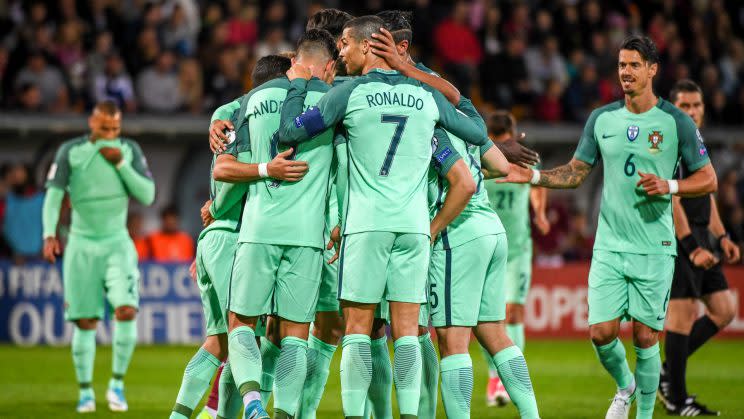As the 10th Confederations Cup kicks off, we still don't know what to make of it

As far as major international soccer tournaments go, the Confederations Cup is a kind of a Rorschach test. Different people see very different things in it.
Some countries value it. Some don’t. Some see it as useful exposure to the stadiums and facilities of a country that will host a World Cup the next year. Some consider it merely another tournament cluttering up the calendar. And some, in fact, think of it as a major prize.
No matter where you stand, the 10th edition kicks off on Saturday, pitting the Russian hosts and the German reigning World Cup champions against the six confederation champions – Australia, Chile, Mexico, New Zealand, Portugal and Cameroon. The U.S. did not qualify for the second straight edition, losing a playoff to Mexico in extra time.
For the fifth time, the tournament, which began its life as the King Fahd Cup in Saudi Arabia, will be held a year out from the World Cup in the host country. That makes it a dry run for Russia, to practice with a mini version of the big tournament – in four of the dozen stadiums and host cities, at least.
Yet after all this time, following 25 years of Confederations Cups, we’re still not entirely sure what to make of the thing. If it’s supposed to be a warm-up to the World Cup, like a preseason college basketball tournament, it does a remarkably poor job of predicting what will actually happen. No team to win the Confederations Cup has ever gone on to win the next World Cup. Only one runner-up has: Brazil, which lost the final to Mexico in 1999, although there was another Confederations Cup held in 2001.
Brazil has won the last three editions, in 2013 – on home soil – and in 2009 and 2005. Yet it hasn’t lifted the World Cup since 2002. Which is all to say that we probably won’t learn a ton.
Yet if few see it as a major prize and it doesn’t serve as a World Cup harbinger, the tournament’s value may nevertheless lay elsewhere. After the U.S. participated in 2009, its fourth appearance, and lost the final to Brazil, it enjoyed real benefits when it returned to South Africa the following summer. The players were familiar with some of the stadiums they would play in, the training grounds they would practice on, the hotels they stayed in. They had gained confidence in beating mighty Spain in the semifinals and taking a 2-0 lead on Brazil in the final.

For a marginal team like the Yanks, that was a valuable advantage going into the World Cup. Acclimating more quickly than your rivals can prove priceless there, where the margins can be minuscule.
It’s quite possible, then, that the biggest benefit of this tournament is to the smaller nations participating in it. Australia and New Zealand will be glad for the run-outs against quality opposition, which can be something of a rarity in their regions of Asia and Oceania. The same is probably true for CONCACAF’s Mexico, even though El Tri will have to slog through a summer that also includes a Gold Cup with a second team.
Chile has won back-to-back Copa Americas — prevailing in the special Centenario edition of 2016 in the United States by beating Argentina on penalties in the final for a second year in a row — but has yet to really break through in the World Cup. La Roja hasn’t made it past the Round of 16 since 1962, when the tournament was held in its own country. This will be a helpful tune-up.
For Cameroon and Russia, neither of whom are expected to contend next year, the likely upside to the tournament will be to gain a little extra sharpness and experience in hopes that it’ll help to survive the group stage — as the hosts and African champions ought to.
Which brings us to the European entrants, Portugal and Germany — the European and world champions, respectively. They ostensibly stand to gain the least from this event, since they’re largely playing down to their opposition. But it so happens that both teams are in something of a rebuilding process — although Germany is much further along than Portugal.
[ Follow FC Yahoo on social media: Twitter | Facebook | Tumblr ]
Long-time Mannschaft pillars Miroslav Klose, Philipp Lahm, Bastian Schweinsteiger, Lukas Podolski and Per Mertesacker have all retired since the last World Cup. A seemingly bottomless well of talent remains, but the Confederations Cup will offer opportunity to help relative newcomers like Matthias Ginter, Joshua Kimmich, Leon Goretzka, Emre Can and Julian Brandt integrate into the team. In fact, head coach Jogi Loew is bringing just two players who have more than 16 caps and not a single player is older than 29.
Portugal, meanwhile, has an aging core on its hands. Bruno Alves, Pepe, Cristiano Ronaldo, Joao Moutinho and Nani are all in their 30s. Yet young studs like William Carvalho, Andre Gomes, Raphael Guerreiro, Bernardo Silva and Andre Silva are all 25 or younger. That’s a tricky puzzle for manager Fernando Santos to work out. And he’ll be glad for the opportunity.
If this all means nobody is solely or necessarily in this tournament with the objective of winning it, that shouldn’t preclude fun games. After all, previous Confederations Cups have provided fireworks. There will be duds as well. But absent anything else to watch, we’ll make do with it.
Which could be the Confederations Cup’s official slogan.
Leander Schaerlaeckens is a Yahoo Sports soccer columnist. Follow him on Twitter @LeanderAlphabet.
More soccer coverage from FC Yahoo:
• How much has FIFA really changed under Gianni Infantino?
• Russia barreling toward politically awkward World Cup one year from now
• As a new USMNT core emerges, the timing of generations is everything


